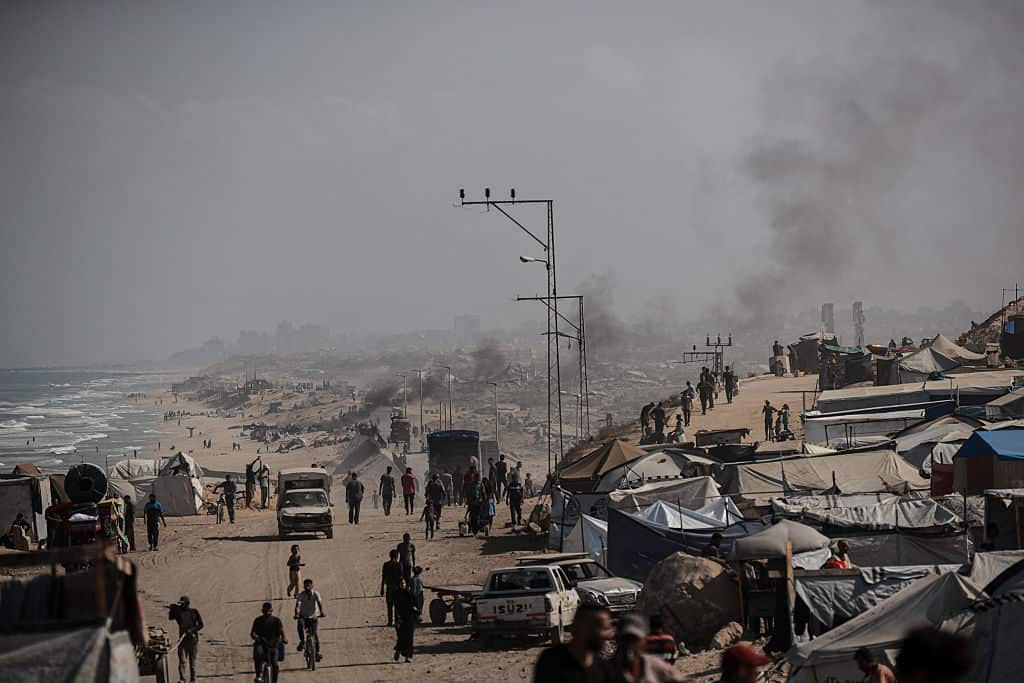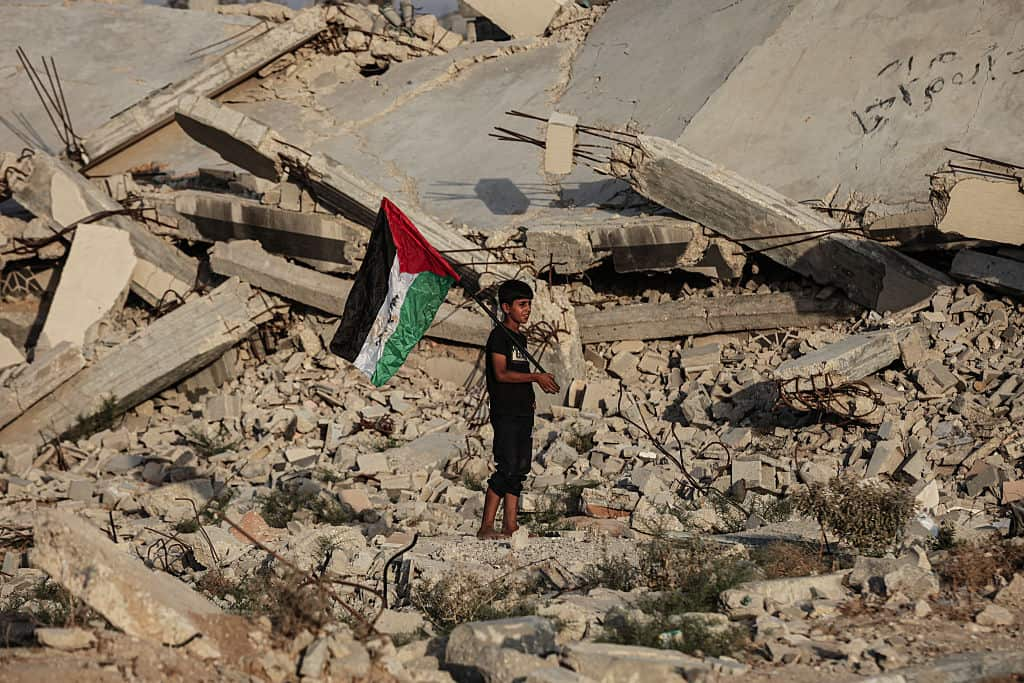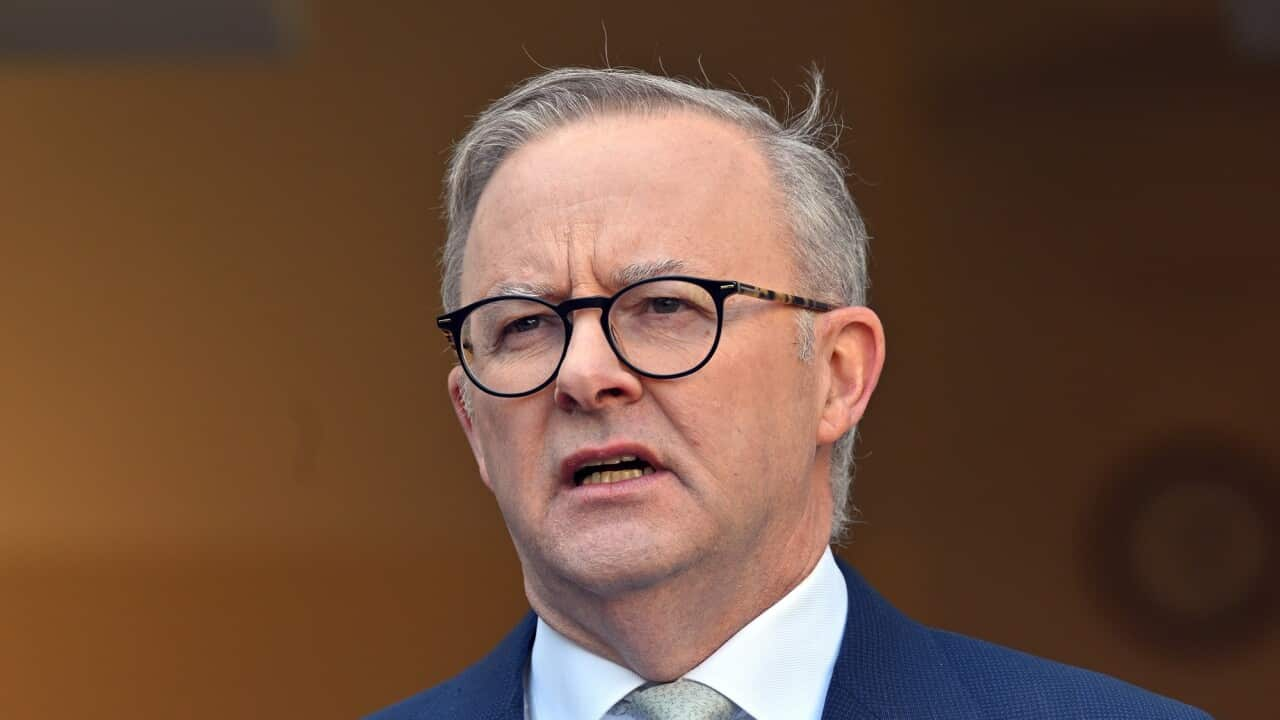After days of speculation, the White House has released a 20-point plan for ending the nearly two-year war in Gaza, releasing hostages held by Hamas, and outlining the Palestinian enclave's future.
Speaking alongside US President Donald Trump at the White House on Tuesday, Israeli Prime Minister Benjamin Netanyahu gave cautious backing to the proposal — though added that Israel was still prepared to "finish the job by itself" if Hamas rejected or countered it.
Prime Minister Anthony Albanese said Australia "welcomes" the plan and encouraged "all parties to engage seriously" with it and work to "bring its vision to reality without delay".
"We commend the plan’s focus on Palestinian self-determination and statehood, and the Palestinian Authority taking back effective control of Gaza. President Trump’s plan reflects a clear rejection of annexation and forced displacement of Palestinians," he said in a statement.
The 20-point plan, which Trump has also circulated to Arab leaders, calls for a ceasefire, release of hostages by Hamas, disarmament of Hamas and gradual Israeli withdrawal from Gaza.
In a crucial change from Trump's earlier apparent goals, Palestinians will not be forced to leave Gaza and instead, the document said, "we will encourage people to stay and offer them the opportunity to build a better Gaza". It also forbade Israel to annex or occupy Gaza.
The running of Gaza will also be overseen by an international 'Board of Peace' headed by Trump.
Netanyahu said the plan "achieves our war aims", while Trump said he was hopeful that Hamas would also give its backing.
Approval from all sides was "beyond very close", Trump said.
Qatari and Egyptian mediators met on Monday with Hamas to provide the Palestinian militant group with the plan, an official briefed on the talks told the Agence France-Presse news agency.
"The Hamas negotiators said they would review it in good faith and provide a response," the source said, speaking on condition of anonymity to discuss the sensitive talks.
However, many important details of the proposal are yet to be clarified.
Netanyahu stressed to reporters that Israeli forces would retain responsibility for Gaza security "for the foreseeable future".
He also cast doubt on whether the Palestinian Authority, which runs the West Bank territory, would be allowed a role in Gaza's governance.
"Gaza will have a peaceful, civilian administration that is run neither by Hamas nor by the Palestinian Authority," Netanyahu said.
The Palestinian Authority supported the plan, welcoming Trump's "sincere and determined efforts".
How Western powers reacted
Early reactions to Trump's Gaza peace plan from world leaders were positive.
Albanese said he had welcomed the opportunity to discuss the plan with other leaders over the past week. The prime minister has been on an 11-day trip to the US, UK and United Arab Emirates.
"Australia affirms the plan’s commitment to denying Hamas any role in the future governance of Gaza, and calls on Hamas to agree to the plan, lay down its arms and release all remaining hostages," he said.
Acting Prime Minister Richard Marles said Australia's concerns were addressed by the plan.
"I do think the plan represents hope," he told ABC Radio on Tuesday.
"We have been calling for a long time for a ceasefire, for the return of hostages, for a flow of humanitarian assistance into Gaza because of the humanitarian catastrophe which is unfolding there."
Marles said the healing and repair process needed to start.
"We obviously have been extremely critical of Hamas and their conduct throughout, we have been critical of Israel, but at the end day what we need to see here is an end to the hostilities and this human tragedy being brought to an end," he said.
French President Emmanuel Macron hailed Trump for his "commitment" to ending the war in Gaza.
In a post on X, he said the Palestinian militant group Hamas now had "no choice but to immediately free all the hostages" seized during the 2023 attacks that sparked the war and called on Israel, whose prime minister said he backed the plan, to "commit resolutely" to it.
UK Prime Minister Keir Starmer's office said the UK "strongly" supported Trump's "efforts to end the fighting, release the hostages and ensure the provision of urgent humanitarian assistance for the people of Gaza".
The plan includes a call for a transitional body in Gaza led by Trump and involving former UK prime minister Tony Blair.
Italy also welcomed the proposal and said it was ready to play its part in close coordination with the United States, European partners and regional actors.
"The proposal presented today by US President Donald Trump could mark a turning point, enabling a permanent cessation of hostilities, the immediate release of all hostages, and full and secure humanitarian access for the civilian population," it said in a statement.
"Hamas, in particular ... now has the opportunity to end it by releasing the hostages, agreeing to have no role in Gaza's future, and fully disarming."
Arab and Muslim states offer support
Eight Arab or Muslim-majority nations said in a joint statement that they "welcome the role of the American president and his sincere efforts aimed at ending the war in Gaza".
They said they "affirm their readiness to engage positively and constructively with the United States and the parties toward finalising the agreement and ensuring its implementation".
The countries include Egypt, Jordan, the United Arab Emirates and Türkiye — which all recognise Israel, although some have turbulent relationships. Indonesia and Pakistan, the world's two most populous Muslim-majority countries, also joined the statement.
Gaza residents sceptical
But residents of war-torn Gaza remained sceptical, dismissing the proposal as a "farce".
"It's clear that this plan is unrealistic", 39-year-old Ibrahim Joudeh told the Agence France-Presse news agency from his shelter in the so-called humanitarian zone of Al-Mawasi in southern Gaza.
"It's drafted with conditions that the US and Israel know Hamas will never accept. For us, that means the war and the suffering will continue".
Abu Mazen Nassar, 52, was equally pessimistic and feared that the plan aimed to trick Palestinian factions into releasing hostages held in Gaza with no peace in return.
"This is all manipulation. What does it mean to hand over all the prisoners without official guarantees to end the war?" said Nassar, displaced from his home in northern Gaza in central Gaza's Deir el-Balah.
"We as a people will not accept this farce," he said, adding: "Whatever Hamas decides now about the deal, it's too late."
Here's an edited version of the plan:
'Redeveloped for the benefit of the people of Gaza'
1. Gaza will be a deradicalised, terror-free zone that does not pose a threat to its neighbours.
2. Gaza will be redeveloped for the benefit of the people of Gaza.
3. If accepted by both sides, the war will end immediately. Israeli forces will pull back to an agreed line for the hostage release, with all military operations suspended and battle lines frozen until a full staged withdrawal is completed.

4. Within 72 hours of Israel publicly accepting this agreement, all hostages, alive and deceased, will be returned.
5. Once all hostages are released, Israel will release 250 life sentence prisoners plus 1,700 Gazans who were detained after October 7 2023, including all women and children. For every Israeli hostage whose remains are released, Israel will release the remains of 15 deceased Gazans.
6. After the hostages' return, Hamas members who disarm and accept peaceful co-existence will receive amnesty, while those choosing to leave Gaza will be granted safe passage abroad.
7. Upon acceptance of this agreement, full aid will be immediately sent into the Gaza Strip.
8. Entry of distribution and aid in the Gaza Strip will proceed without interference.
Gaza overseen by 'board of peace'
9. Gaza will be run by a temporary technocratic Palestinian committee managing public services. This will be overseen by an international transitional body, the Board of Peace, which will be chaired by Trump and include leaders such as Blair. The Board will provide oversight and funding for Gaza’s redevelopment until the reformed Palestinian Authority is ready to resume control of Gaza.
10. A Trump economic development plan will rebuild Gaza through a panel of experts behind successful Middle Eastern cities. International investment proposals will be integrated with new security and governance frameworks to attract capital, create jobs, and offer Gaza a hopeful future.
11. A special economic zone will be created with negotiated preferential tariffs and access for participating countries.
12. No one will be forced to leave Gaza, and those who wish to leave will be free to do so and free to return. We will encourage people to stay and offer them the opportunity to build a better Gaza.
13. Hamas and other factions will have no role in governing Gaza, and all military and terror infrastructure will be dismantled. Gaza will undergo monitored demilitarisation, with weapons decommissioned through an internationally funded buyback and reintegration program. The new Gaza will focus on economic growth and peaceful coexistence with its neighbours.

14. A guarantee will be provided by regional partners to ensure that Hamas and the factions comply with their obligations and that New Gaza poses no threat to its neighbours or its people.
15. The US, with Arab and international partners, will form a temporary International Stabilisation Force (ISF) to deploy in Gaza. The ISF will train vetted Palestinian police, coordinate with Jordan and Egypt, and work with Israel and Egypt to secure borders, block weapons smuggling, and ensure the safe flow of goods for Gaza’s reconstruction.
'Israel will not occupy or annex Gaza'
16. Israel will not occupy or annex Gaza. The IDF will withdraw in stages, handing territory to the ISF under agreed milestones tied to demilitarisation, until a full withdrawal is complete and Gaza poses no threat to Israel. A limited security perimeter will remain until Gaza is secure from renewed terror threats.
17. In the event Hamas delays or rejects this proposal, the above, including the scaled-up aid operation, will proceed in the terror-free areas handed over from the IDF to the ISF.
18. An interfaith dialogue process will be established based on the values of tolerance and peaceful co-existence to try and change mindsets and narratives of Palestinians and Israelis by emphasising the benefits that can be derived from peace.
19. As Gaza’s redevelopment progresses and PA reforms take hold, conditions may finally allow a credible path to Palestinian self-determination and statehood, reflecting the aspirations of the Palestinian people.
20. The US will establish a dialogue between Israel and the Palestinians to agree on a political horizon for peaceful and prosperous co-existence.
Israel has bombarded Gaza since Hamas' October 7 2023 attack in which more than 1,200 people, including an estimated 30 children, were killed and over 200 hostages taken, according to the Israeli government.
More than 66,000 people have been killed in Gaza since October 7, according to the health ministry in Gaza.
The October 7 attack was a significant escalation in the long-standing conflict between Israel and Hamas.
With additional reporting by the Agence France-Presse news agency.
For the latest from SBS News, download our app and subscribe to our newsletter.

